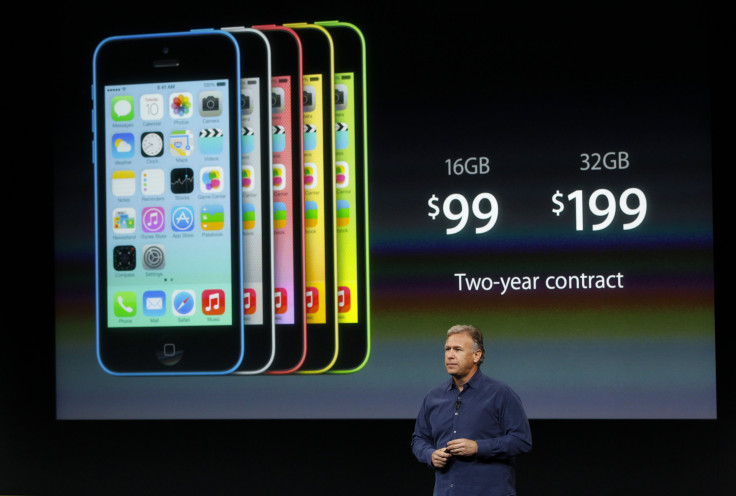Apple Inc. (AAPL) China Event Preview: Partnership With China Mobile Ltd. (CHL) Possible, But iPhone 5S And 5C Seem Too Expensive

In an unprecedented move, Apple Inc. (NASDAQ:AAPL) is hosting two separate press events to announce, among other news, the new iPhone 5S and iPhone 5C. One event took place in Cupertino, Calif., this morning, while the second will be in Beijing on Wednesday morning. Apple plans to release the new iPhones in China starting on Sept. 20, so the big news is expected to be Apple’s much-hyped partnership with China Mobile Ltd. (NYSE:CHL), which holds the key to 745 million potential consumers for Apple.
(Read more about the actual event, which took place on Tuesday, and the Chinese's reaction here.)
In China, Apple partners with China Telecom Corporation Limited (NYSE:CHA) and China Unicom (NYSE:CHU), but has thus far failed to bag state-owned China Mobile, the country’s largest mobile operator, yet also the largest telecommunications carrier in the world. The Chinese company has resisted Apple’s demands for subsidy and special treatment, which, let’s be honest, not many else would dare to deny Apple.
There have been rumors that the two giants have worked out a deal, according to the Mac Observer, and Apple’s planned event in China lends substantial credibility to the rumor. After all, with the new models already unveiled and confirmed to be sold in China, what else could warrant a separate announcement?
The partnership, if it goes through, would be beneficial for both companies. Apple needs access to China Mobile’s huge customer base -- 745 million is more than the number of people in the U.S., and China Mobile needs help expanding its 3G and upcoming 4G networks.
Many Chinese Apple enthusiasts have stayed up, as they always do, for the American event, and subsequently taken to Weibo, China’s Twitter-like microblogging platform, to complain (also a tradition). Two main dissatisfactions are the fact there was little surprise in Apple’s event, with most of the details on the new phones leaked prior, and that the phones will be sold at such enormous markups in China.
At the Cupertino event, it was announced that the 16 GB iPhone 5C will sell for $99, and the 32 GB for $199, with service plans. The iPhone 5S price starts at $199 for 16GB, while the 32 GB and 64 GB will cost $299 and $399 respectively.
Apple’s Chinese website shows, however, that the 5C will start at 4,488 yuan ($733.33), with the most expensive 64 GB 5s costing 6,888 yuan. Those are huge markups, but at least the numbers are auspicious.
It’s worth pointing out the prices in China are for phones without plans. Chinese mobile operators may very well choose to subsidize the product and package iPhones with their plans. China Telecom’s decision in the past to offer a fully subsidized iPhone 4S has paid off handsomely for China’s smallest mobile operator -- its mobile revenues jumped by 28.3 percent in the first half of 2013, and it added 18.3 million 3G subscribers during the same period, according to Apple Insider.
Nonetheless, the Chinese are not happy with the difference in prices, the less-than-exciting new phones or Tim Cook, who is losing a "Pick Your Favorite Apple Leader" survey on Weibo against Steve Jobs, at 92 to 450. Maybe if Cook makes it in time for the Beijing event, they'll be happier.
“I heard during their latest press conference, Apple announced an iTouch that carries a SIM card,” one Weibo user wrote, jabbing at the 5C, which some on Weibo have said looks like the shanzhai, or pirated version of the 5S.
“Disappointed with the 5S. The fingerprint identification doesn’t look useful, double LED is a glorified flashlight. 5S is selling for more than 4000! Missing Steve Jobs!” another Weibo user wrote.
The prices do seem high, especially when the 5C is an attempt to win over Chinese consumers who can’t afford regular iPhones; the average per capita annual income in China is around $7,500. Apple has already lost a sizeable portion of its market share to Xiaomi, the Chinese startup that has been in the news lately for poaching a top Google executive, as Xiaomi’s smart phones cost less than half the typical price of an iPhone 5, the New York Times reported.
Western brands are usually considered luxury brands in China, and tend to cost more there: A grande latte at Starbucks (NASDAQ:SBUX), for example, is nearly $1 more expensive in China compared to the U.S. -- due to government taxes and import tariffs, according to the Wall Street Journal.
© Copyright IBTimes 2024. All rights reserved.




















